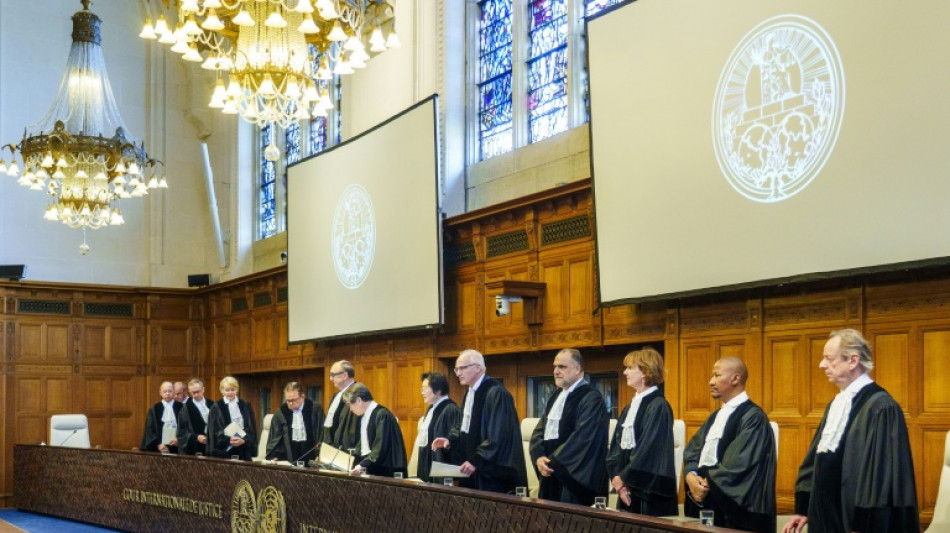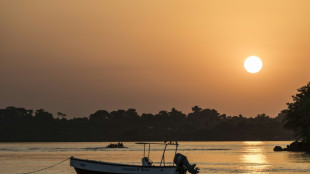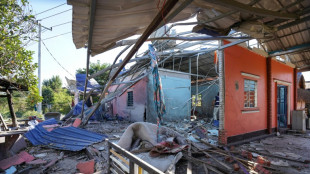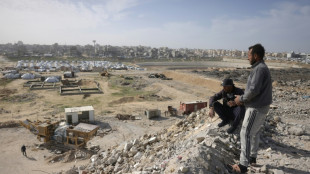
-
 Frank defends Van de Ven after Slot slams 'reckless' foul on Isak
Frank defends Van de Ven after Slot slams 'reckless' foul on Isak
-
Russian paramilitaries in CAR say take election threat 'extremely seriously'

-
 Trump in the Epstein files: five takeaways from latest release
Trump in the Epstein files: five takeaways from latest release
-
UK govt to relax farmers inheritance tax after protests

-
 Pakistani firm wins auction for state airline PIA
Pakistani firm wins auction for state airline PIA
-
Stocks slip on strong US growth data

-
 DR Congo beat Benin to kick off Cup of Nations bid
DR Congo beat Benin to kick off Cup of Nations bid
-
New Epstein files dump contains multiple Trump references

-
 Russian strike could collapse Chernobyl shelter: plant director
Russian strike could collapse Chernobyl shelter: plant director
-
Springbok captain Kolisi to rejoin Stormers

-
 Italy fines Ryanair $300 mn for abuse of dominant position
Italy fines Ryanair $300 mn for abuse of dominant position
-
Mahrez eyes strong AFCON showing from Algeria

-
 Killer in Croatia school attack gets maximum 50-year sentence
Killer in Croatia school attack gets maximum 50-year sentence
-
Thousands of new Epstein-linked documents released by US Justice Dept

-
 Stocks steady as rate cut hopes bring Christmas cheer
Stocks steady as rate cut hopes bring Christmas cheer
-
Bangladesh summons Indian envoy as protest erupts in New Delhi

-
 Liverpool's Isak faces two months out after 'reckless' tackle: Slot
Liverpool's Isak faces two months out after 'reckless' tackle: Slot
-
For director Josh Safdie, 'Marty Supreme' and Timothee Chalamet are one and the same

-
 Kyiv's wartime Christmas showcases city's 'split' reality
Kyiv's wartime Christmas showcases city's 'split' reality
-
Locals sound alarm as Bijagos Islands slowly swallowed by sea

-
 Cambodia asks Thailand to move border talks to Malaysia
Cambodia asks Thailand to move border talks to Malaysia
-
In Bulgaria, villagers fret about euro introduction

-
 Key to probe England's 'stag-do' drinking on Ashes beach break
Key to probe England's 'stag-do' drinking on Ashes beach break
-
Delayed US data expected to show solid growth in 3rd quarter

-
 Thunder bounce back to down Grizzlies, Nuggets sink Jazz
Thunder bounce back to down Grizzlies, Nuggets sink Jazz
-
Amazon says blocked 1,800 North Koreans from applying for jobs

-
 Trump says US needs Greenland 'for national security'
Trump says US needs Greenland 'for national security'
-
Purdy first 49er since Montana to throw five TDs as Colts beaten

-
 North Korea's Kim tours hot tubs, BBQ joints at lavish new mountain resort
North Korea's Kim tours hot tubs, BBQ joints at lavish new mountain resort
-
Asian markets rally again as rate cut hopes bring Christmas cheer

-
 Australian state poised to approve sweeping new gun laws, protest ban
Australian state poised to approve sweeping new gun laws, protest ban
-
Trapped under Israeli bombardment, Gazans fear the 'new border'

-
 Families want answers a year after South Korea's deadliest plane crash
Families want answers a year after South Korea's deadliest plane crash
-
Myanmar's long march of military rule

-
 Disputed Myanmar election wins China's vote of confidence
Disputed Myanmar election wins China's vote of confidence
-
Myanmar junta stages election after five years of civil war

-
 Ozempic Meals? Restaurants shrink portions to match bite-sized hunger
Ozempic Meals? Restaurants shrink portions to match bite-sized hunger
-
'Help me, I'm dying': inside Ecuador's TB-ridden gang-plagued prisons

-
 Australia's Cummins, Lyon out of fourth Ashes Test
Australia's Cummins, Lyon out of fourth Ashes Test
-
US singer Barry Manilow reveals lung cancer diagnosis

-
 'Call of Duty' co-creator Vince Zampella killed in car crash
'Call of Duty' co-creator Vince Zampella killed in car crash
-
Kultura Brands Exceeds Original 5.0 Billion Share Retirement Goal, Significantly Reduces Preferred H Overhang

-
 EVCS Appoints Eric Danner as Chief Executive Officer; Gustavo Occhiuzzo Named Executive Chairman & Chief Strategy Officer
EVCS Appoints Eric Danner as Chief Executive Officer; Gustavo Occhiuzzo Named Executive Chairman & Chief Strategy Officer
-
BCII Enterprises Appoints Emmy Award-Winning Media Strategist and Former White House Advisor Evan "Thor" Torrens as Strategic Advisor

-
 Diginex: Capital Discipline Is Becoming the Signal in ESG Infrastructure
Diginex: Capital Discipline Is Becoming the Signal in ESG Infrastructure
-
Kele, Inc. Appoints Mark Sciortino as Chief Growth Officer

-
 Primary Endpoint Successfully Achieved in Lexaria's Phase 1b Study GLP-1-H24-4
Primary Endpoint Successfully Achieved in Lexaria's Phase 1b Study GLP-1-H24-4
-
SMX Expands Precious Metals Strategy Through New Identity Infrastructure Partnerships

-
 NuRAN Announces Closing of the Restructuring Transaction and Initial Tranche of Additional Debt Settlements
NuRAN Announces Closing of the Restructuring Transaction and Initial Tranche of Additional Debt Settlements
-
Dolphin Subsidiary Shore Fire Media's Podcast Clients Recognized as 2025's Best


ICJ climate ruling: five things to watch for
The International Court of Justice is preparing to hand down its first-ever opinion on climate change, seen by many as a historic moment in international law.
Judges have waded through tens of thousands of pages of written submissions and heard two weeks of oral arguments during the ICJ's biggest-ever case.
Its own "advisory opinion" is expected to run to several hundred pages, as it clarifies nations' obligations to prevent climate change and the consequences for polluters that have failed to do so.
Here are some of the key things to watch for when the ICJ delivers its ruling at 1300 GMT on Wednesday:
- What legal framework? -
This is the crux of the matter and speaks to the first question put to the court on countries' responsibilities to tackle climate change.
ICJ judges will seek to pull together different strands of environmental law into one definitive international standard.
Top polluters say this is unnecessary, and that the legal provisions under the United Nations Framework Convention on Climate Change (UNFCCC) are sufficient.
But opponents argue the ICJ should adopt a broader yardstick, including human rights law and the laws of the sea.
Vanuatu urged judges to consider "the entire corpus of international law" in its opinion, arguing the ICJ was uniquely placed to do so.
The ICJ is "the only international jurisdiction with a general competence over all areas of international law, which allows it to provide such an answer," said Vanuatu.
- And the consequences? -
This is the more controversial second question the judges will consider: what are the legal repercussions -- if any -- for countries who significantly contribute to the climate crisis?
The United States, the world's biggest historical emitter of greenhouse gases, and other top polluters referred the court to the landmark 2015 Paris Agreement, which does not explicitly provide for direct compensation for past damage.
Issues around liability are highly sensitive in climate negotiations, but at UN talks in 2022 wealthy nations did agree to create a fund to help vulnerable countries deal with current impacts caused by past pollution.
Many top polluters also say it is impossible to assign blame to individual countries for a global phenomenon with unequal effects.
Those on the other side of the debate point to a basic principle of international law -- "ubi jus, ubi remedium" -- roughly speaking, where there's blame, there's a claim.
In legal jargon, this should result in cessation, non-repetition and reparation, argue the climate-vulnerable nations.
They want the ICJ to propose a stop to fossil fuel subsidies, a drastic reduction in emissions, and a formal commitment and timeline for decarbonisation.
They also demand monetary reparation, as well as increased support for adapting to the devastating future effects of climate change.
- Harm or no harm? -
Another key point is the issue of "transboundary" law, often known as the "no-harm" rule.
Put simply, this key tenet of international law means one state should not permit activities on its territory that could cause damage to another.
The question ICJ judges will have to consider is: does this apply to greenhouse gas emissions that have contributed to climate change?
Major polluters argue this law does not apply to climate change as there is no single, specific source that can be identified as damaging another state.
Others say that climate change should not be an exception.
Other major international judicial decisions in recent months have looked to increasing scientific precision in the link between human-caused climate change and severe impacts like extreme weather, nature loss and sea level rise.
- When did they know? -
A fundamental debating point in the oral hearings was: when did governments become aware greenhouse gas emissions were harming the planet?
The late 1980s, according to the United States. Switzerland said no one could have linked emissions to rising temperatures before scientific studies in that decade.
Rubbish, say climate-vulnerable countries, who point to research in developed nations as early as the 1960s.
This could have an impact on when potential reparations kick in.
- 'Future generations' -
The concept of "intergenerational equity" is another fundamental demand of the young climate justice campaigners who helped bring this case to the world's highest court.
"The impact of climate change is not bounded by time," argued Namibia, with the worst effects hitting people decades or maybe centuries later.
But developed countries counter that the rights of as-yet-unborn people have no force in international law.
"Human beings alive now cannot claim rights on behalf of future generations," argued Germany.
L.Durand--AMWN